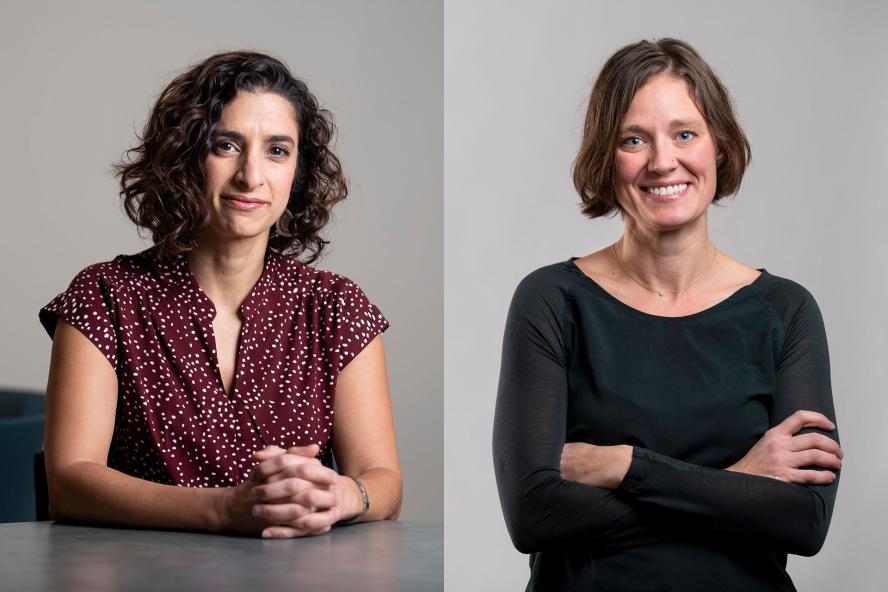Faculty Focus: Spring 2020

The Pursuit of Educational Equality
Featuring cheating celebrities and abuses of privilege, the college admissions scandal has captured the nation's attention for months. The sordid affair raises intriguing questions about who gets to attend highly selective academic institutions and the fairness of the admissions process.
Natasha Kumar Warikoo has devoted much of her career to studying racial and ethnic inequality in education. Her most recent book, The Diversity Bargain: And Other Dilemmas of Race, Admissions, and Meritocracy at Elite Universities (2016), looks at how undergraduates at Harvard, Brown, and Oxford think about race and meritocracy. When the admissions scandal broke, she found herself inundated with media requests to speak on the topic.
"Elite institutions carry a lot of symbolic meaning in our society; people uphold them as bastions of intellectual rigor and excellence," Warikoo says. "People care a lot about what's happening in those places, so the scandal did bring more attention to my book and other things I've written about college admissions."
Two stints as a teacher in New York City public schools are what sparked Warikoo's interest in inequality in education. At the first of these schools, the student body ranged from kids living in poverty to children of privilege. After earning her master's degree in education from Harvard, she taught at a school serving recently arrived immigrants, all of whom were English language learners.
"Toward the end of my teaching career, I started thinking a lot about how factors such as socioeconomic inequality, school funding, and immigration policies were shaping students' educational experiences," Warikoo says. "I wanted to do research on these questions, and I realized the field of sociology was where people were doing this."
Warikoo subsequently earned her Ph.D. in sociology from Harvard, where she was later named an associate professor of education in the Graduate School of Education. Along the way, she became an in-demand author and speaker on topics including affirmative action, diversity, race and ethnicity in education, and immigrant issues.
During the interview process with Tufts, Warikoo had the chance to meet several sociology students. She came away impressed with their knowledge of the field of sociology and their depth of engagement in their research. Her future colleagues in the sociology department were another major draw.
"It's a diverse group studying a lot of different aspects of society, from things like migration, education, and race, to public health, globalization, inequality around the world, social media, and crime," she says. "The combination of synergy with my own work and being able to learn from people doing different kinds of work is exciting to me."
This spring, Warikoo will teach "Sociology of Education," a foundations course examining the role of schools in society, with a focus on the impact of education on social inequality. The subject matter couldn't be a better fit for her.
"I'm thrilled to be coming to Tufts, and I can't wait to get started," she says.
At Home in the Field
Geologist Jill VanTongeren's work has taken her to exotic locations across the globe. Now it's taking her to Medford, Massachusetts. She comes to Tufts after spending five years at Rutgers University, most recently as an associate professor.
In her research, VanTongeren focuses primarily on the evolution of large magma chambers — reservoirs in the Earth's crust that store extremely hot liquid and semi-liquid rock before it erupts onto the surface as lava. She also studies thermal evolution and cooling rates in the lower oceanic crust and how the oceanic crust might have formed several billion years ago.
VanTongeren first became interested in geology while taking an introductory geology course at the University of Michigan. Following her freshman year, she joined professors and fellow students for an extended tour of geological sites around the United States. "Getting college credit for riding around in minivans and seeing the country — it was great," she says. "Geologists tend to be laidback and fun, and I enjoyed camping and being outdoors so much."
VanTongeren, who went on to earn her B.S. in geological sciences from Michigan and M.A. and Ph.D. in earth and environmental sciences from Columbia University, has vigorously pursued her love for field work ever since. In order to explore magma chambers, she has journeyed to South Africa's Bushveld Complex and the Dufek Intrusion of Antarctica. She has also studied the oceanic crust through trips to the Oman ophiolite, where a former seafloor has been thrust up and exposed on the land.
Of course, VanTongeren is aware of the risks that come with working in such remote locations. "These are not well-controlled environments," she notes. "In Antarctica, a plane drops you off and you make plans for when they'll pick you up again. If they're delayed for some reason, you have to live off whatever supplies you have in reserve because there's no other way out."
Now the mom of two young children, VanTongeren has cut back on her field work in recent years. But with her husband employed by MIT, she has been regularly commuting from their home in Greater Boston to her job at Rutgers. She looks forward to spending more time with her family, both at home as well as rock climbing and downhill skiing throughout New England.
At Tufts, VanTongeren will be teaching courses on mineralogy and petrology (the study of igneous and metamorphic rocks). Her plans also include developing a field methods course and setting up a laser ablation lab, which will be able to measure trace elements and ages of samples from around the world.
"I'm excited to work at Tufts and be a part of the long legacy of educating great earth and ocean scientists," VanTongeren says.